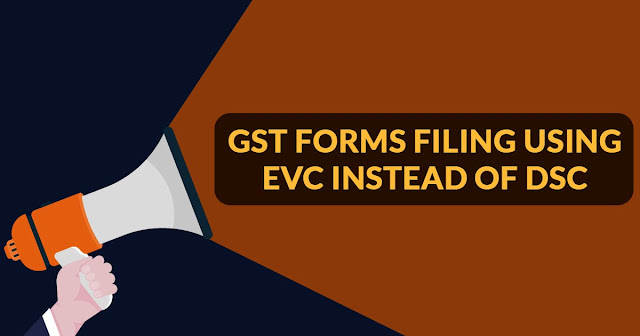The CBIC official department has declared earlier that the filing of GSTR -3B summary form and GSTR - 1 sales form or IFF by organizations using the Electronic Verification Code (EVC) feature, instead of Digital Signature Certificates (DSC) has been moreover forwarded till the 31st October 2021 for the span from 27th April 2021 to 31st August 2021.
According to the circular of CBIC, the closing date extension of the late fee reprieve scheme and extension of the time limit for filing a revocation application for cancellation registration will profit a massive number of taxpayers, mainly small taxpayers who could not e-file their GST returns in time because of multiple reasons, primarily due to complexities caused by COVID-19, and whose GST registrations were canceled because of the same. Taxpayers are asked to aid the main benefit of these latest extensions at the earliest to decline the last-minute rush.
What Does GSTR -1 Mean?
GSTR -1 is known for monthly or quarterly returns that should be e-filed by every GST registered person, besides a few as mentioned in further sections. It holds details of all outward supplies like sales. The return has an overall of 13 sections. Each registered person is needed to file GSTR -1 filers, irrespective of whether there are any transactions meanwhile the period or not. For clear GSTR -1 from e-filers, there is a facility to file via an SMS that initiates from the 1st week of July month 2020.
The due date to return file Form GSTR 1 for a provided tax duration is the 11th day of the succeeding month in the matter of taxpayers filing it monthly and the 13th day of month succeeding the end of every quarter in the matter of assessees filing quarterly or such other dates as might be extended by Government through notification.
For example, for file
GSTR 1 Return Filing Due Date, Form GSTR-1 for the calendar month of January 2024 is required to be filed by 11th February 2024. Form GSTR-1 for the quarter of January to March 2024, is required to be filed by 13th April, 2024.
The registered individuals are excluded from filing the form GSTR - 1 namely Input Services Distributors, Composition Dealers, Suppliers, of (OIDAR, who have to pay tax themselves (as per Section 14 of the IGST Act), Non - resident taxable person, Taxpayer responsible to collect TCS, and Taxpayer responsible to deduct TDS.
In Form GSTR -1, particular details that are needed to file are GST identification number, Taxable person Name, Aggregate Net worth of the Taxable Person in the previous financial year, Taxable outer supplies to a customer where the place of supply ( State Code) is other than the state where suppliers are placed ( Inter - state supplies) and bills value is far more than Rs 2.5 lakh, AlterarationAlteration to taxable outward supplies to a consumer of old tax periods where the place of supply (State Code) is other than the State where Supplier is placed ( Inter - state supplies) and bills value is greater than Rs. 2.5 lakh, Taxable outer supplies to consumer (other than 6 above), Modification to Taxable outward supplies to the customer of recent tax periods ( original supplies embraced under 7 above in the recent tax period (s) ), Details of Credit/Debit Notes, Amendment to
Details of Credit/Debit Notes of earlier tax periods, clear rated, Exempted and Non-GST outward supplies, Supplies Exported (indulging deemed exports), Amendment to Supplies Exported (including deemed exports), Tax liability upgrading in respect of account of Time of Supply without the emission of bills in the same span, Amendment to tax responsibility arising in respect of Time of Supply without emission of bills in the same tax period, Tax previously paid ( on advance receipt / on account of the time of supply) on bills provide in the present time, Supplies made through e-commerce websites or portals of other organizations, supplies made through e-commerce portals of different organizations to unregistered individuals, Amendment to supplies made via e-commerce websites or portals of different organizations to unregistered Taxable individuals, bills provide in terms of inward supplies received from unregistered individuals accountable for opposite charge , and self disclosure.
What is Form GSTR - 3B?
The form GSTR - 3B is a self-announced synopsis of the GST return filed each month ( quarterly for the QRMP scheme). It should be filed by a registered taxpayer from July 2017 ahead. A particular GSTR -3B should be filed for each GSTIN. The GST accountability must be paid on or prior to the
date of filing GSTR 3B, before the due date.
From September 2021, taxpayers wouldn’t be required to e-file GSTR -1 form or use the IFF for August 2021 on the GSTN portal if they have unresolved GSTR - 3B filings. It is applicable if GSTR -3B is unresolved for the last two months up till July month 2021 ( monthly filer ) or for the last quarter ending June 30th, 2021 ( quarterly filer) according to CGST Rule 59 (6).
In case, Form GSTR -3B is open for the selected span can be filed. The Invoice Furnishing Facility is a service that permits quarterly taxpayers in the system of the
QRMP scheme to register their taxable supplies of outward to a registered individual.


Comments
Post a Comment